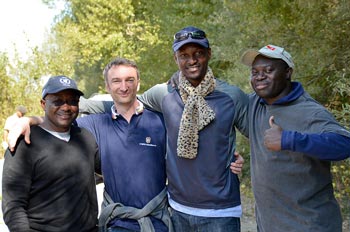
Computer Science students lead the way to redevelopment in Haiti
“I was a university student doing a Bachelor Degree in Computer Science before the earthquake,” says Emmanuel Willer. “After the earthquake, everything stopped…”
“I was doing a Masters Degree in Computer Science when the earthquake hit,” says Joel Barthelemy. “After the earthquake it was not easy to do anything because you have your own family with troubles and all your friends have problems too...”
Francis Koroma, WFP Chad; Cyril Molines, WHO Denmark; Joel Barthelemy, Canadian Red Cross; Stephen Ciirah, WVI at the IT EMT. Photo credit: WFP/Rob Buurveld
The 2010 earthquake in Haiti has the unfortunate distinctions of being the ‘fifth deadliest natural disaster of all time’ and the ‘largest urban disaster in modern history’. Titles that it would almost never be associated with are ‘enabler of opportunities’ or ‘afforder of brighter futures’. However now, two years later, two computer science students from Ecole Supérieure d’Infotronique d’Haïti draw this silver-lining from one of the world’s most catastrophic disasters.
“After the earthquake, NetHope came to my university looking for people who have skills in computer science to give them the opportunity to get additional training and an internship,” says Joel. “In Haiti it is not easy to find a job, even if you have an education and a degree it is still not easy.”

The NetHope Academy Haiti is a six-month programme, run by NGO collaboration NetHope, which provides Haitian computer science students with classroom and on-the-job IT skills training. The inaugural programme was launched six months after the earthquake and Emmanuel and Joel were amongst 39 students selected to participate from nearly 300 applicants.
“After the earthquake, almost all universities had collapsed. This was a huge handicap for education in Haiti. When NetHope came up, it was a shining light for young aspiring IT professionals.”
Rob Buurveld, WFP FITTEST; Emmanuel Willer, Canadian Red Cross; Cyril Molines, WHO Denmark; Romuald Sawadago, WFP Central African Republic at the IT EMT. Photo credit: WFP
Through classroom education and internship placements with international NGOs, NetHope Academy prepares students for full-time IT careers while allowing them to directly participate in the reconstruction of their communities. After completing the course, both Emmanuel and Joel began working with Canadian Red Cross – Emmanuel as an ICT Officer and Joel as a Database Administrator.
“When the cholera emergency started we set up a treatment centre in Carrefour in the west,” says Emmanuel. “While the centre focused on health, it was still important for staff to be able to respond to email and access corporate systems. We had to bring up all the ICT equipment and install it for everyone to use. Everything around the centre was still collapsed. At that time many of the roads were not ready to move on so transporting was also difficult. I learnt a lot from this experience.”
In 2011, Emmanuel and Joel were also selected to participate in the annual IT Emergency Management Training - funded by the Vodafone Foundation and World Food Programme partnership - in Pisa, Italy.
“Emmanuel and I were the first Haitians who came to Pisa for this training,” says Joel. “I was really proud to be there. I never imagined that I would be in training like that in a place like that.
“Now in Haiti we have a lot of things to focus on,” says Emmanuel. “Technology can be used anywhere and can be used for everything. In the coming years I would like to see the latest advancements in technology being used to help our redevelopment. I would like to use my skills to contribute to this.”
Supported by Voila, Microsoft, Accenture and Cisco, the NetHope Academy Haiti programme is continuing; a second session began in September 2011. Host organizations for graduates include NetHope members World Vision, Save the Children, Mercy Corps, Canadian Red Cross, CHF International, Oxfam GB and Catholic Relief Services. Other host organizations include World Health Organization, World Food Programme and Haiti Technology Group.